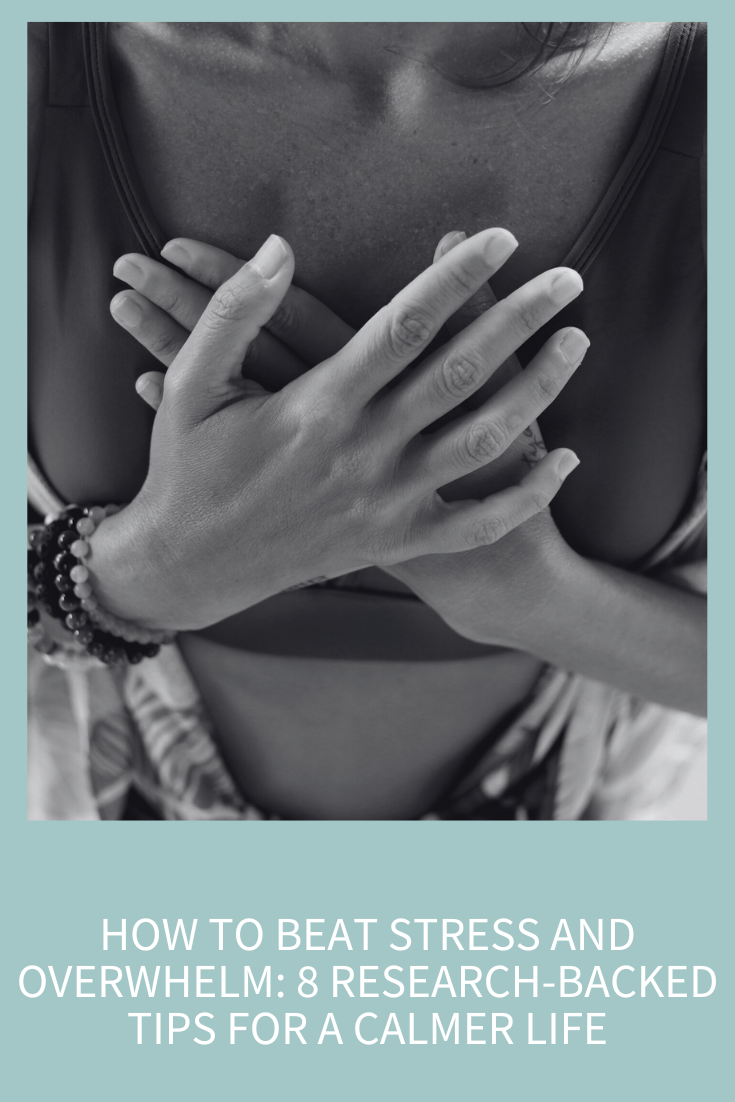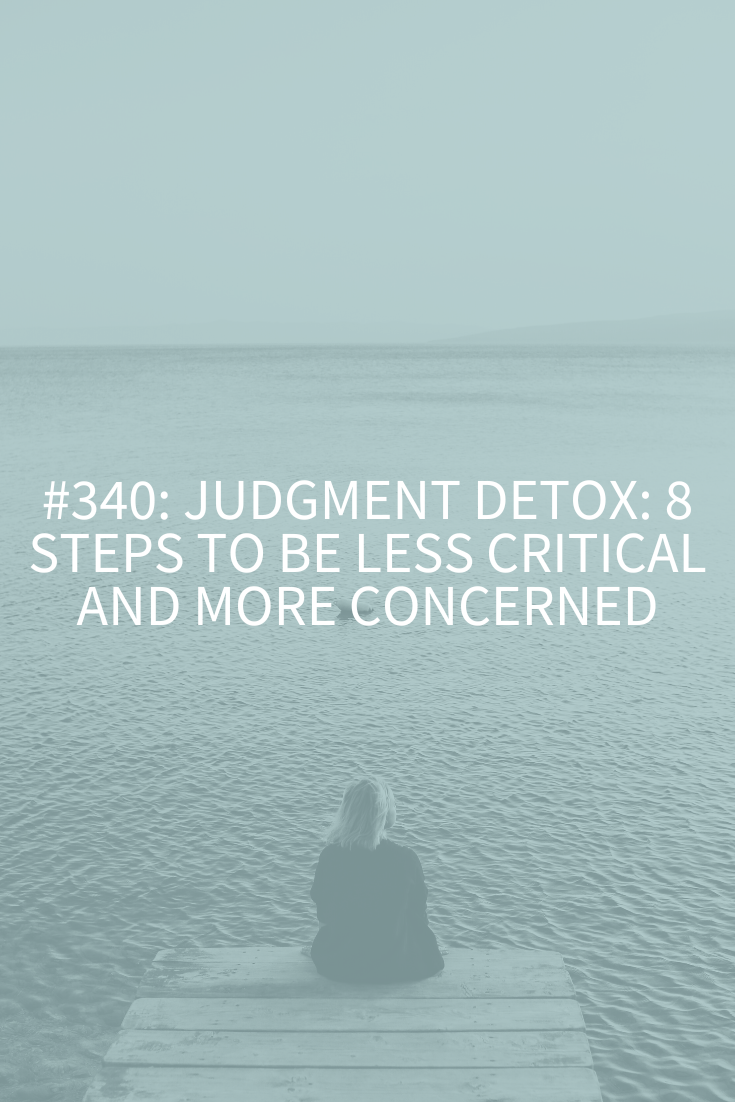
Let’s be real: life can feel like a never-ending hamster wheel. Between work, family, relationships, and that ever-growing to-do list, it’s easy to feel like you’re drowning in a sea of responsibilities. Stress and overwhelm don’t just impact your mood – they can wreck your relationships, health, and overall quality of life. But here’s the good news: you can take back control. Today we’ll talk about the three main reasons you get stressed and overwhelmed and my top eight, research-backed strategies to get from overwhelmed to peaceful.
9-minute read
Why We Get Stressed and Overwhelmed
When you encounter a stressful situation, your body’s natural response is to activate the amygdala, the brain region responsible for processing emotions and triggering the fight-or-flight response. This activation leads to the release of stress hormones, such as cortisol and adrenaline, preparing your body to either confront or run from the perceived threat. While this response is beneficial in acute, life-threatening scenarios, chronic activation due to ongoing stress can have detrimental effects on your health.
Prolonged exposure to elevated cortisol levels is associated with an increased risk of anxiety, depression, cardiovascular diseases, and a weakened immune system. Understanding this physiological process underscores the importance of effective stress management techniques to maintain both mental and physical well-being.
But if you feel like you’re constantly battling feeling stressed and overwhelmed we need to look at three key factors:
- Learned Patterns from Childhood: Many of us learn how to react to stress by observing the adults in our lives. If you saw your parents overreacting to small problems or struggling to manage their stress, you might have internalized those same patterns. Conversely, if they avoided addressing stressful situations altogether, you might struggle with avoidance or procrastination now.
- Perfectionism and Unrealistic Expectations: Society (especially here in the US) often glorifies productivity and “having it all together,” which can make you set unattainable goals for yourself. When you can’t meet those expectations, feelings of overwhelm and inadequacy can creep in.
- Fear of Disappointing Others: Many people equate saying “no” or setting boundaries with letting others down. This can lead to overcommitting, taking on too much, and feeling overwhelmed when there simply isn’t enough time or energy to go around.
Understanding these deeper causes can help you address the roots of your stress, not just the symptoms.
Eight Research-Backed Strategies to Manage Stress and Overwhelm
1. Start with Mindfulness: Tame the Monkey Mind
Mindfulness isn’t just about meditating on a cushion for hours. It can also look like paying attention to the texture and taste of your food while eating or noticing the sensation of your feet hitting the ground during a walk. By bringing full awareness to these everyday activities, you can train your brain to stay present and reduce stress in real-time. It’s about training your brain to focus on the present moment, which can significantly reduce stress.
2. Prioritize and Say “No”
Overwhelm often comes from saying “yes” to too many things. For example, agreeing to help a coworker with their project even when your own deadlines are tight can lead to added stress. Similarly, committing to bake cookies for your kid’s school event when you’re already swamped at work might push you over the edge. To navigate these situations, try setting boundaries by saying, “I’d love to help, but I don’t have the bandwidth right now.” Or offer an alternative: “I can’t bake cookies, but I can contribute store-bought ones instead.” The next time someone asks for your time, pause and ask yourself: “Does this align with my priorities?” If it doesn’t, give yourself permission to say no. Practice saying, “Thank you for thinking of me, but I can’t commit to this right now” and thin of saying “no” first!
If you want to learn more about your emotional bandwidth check out this episode.
3. Use the Power of Small Wins
Psychologist Teresa Amabile’s research highlights the power of progress, even small wins, in boosting motivation and reducing stress. And Dr. BJ Fogg was here on the podcast talking about the effectiveness of Tiny Habits.
For example, in a work context, you might set a goal to respond to five emails rather than tackling your entire inbox at once. At home, celebrate small wins like organizing a single drawer instead of the whole kitchen. I like to set a timer for 10 minutes and clean as much as I can of the kitchen in that time. The research shows that these incremental achievements create a snowball effect, building momentum and a sense of accomplishment.
4. Move Your Body: Exercise to Destress
You’ve heard this from me before: the research shows that exercise is one of the best stress relievers out there. Regular physical activity reduces levels of cortisol while boosting endorphins, those feel-good hormones. Different types of exercise can uniquely impact stress levels. For instance, cardio activities like running or cycling are great for releasing pent-up energy and increasing overall stamina, while yoga focuses on deep breathing and stretching, activating your parasympathetic nervous system to promote relaxation. Strength training, on the other hand, can boost confidence and mental resilience as you see progress over time. By choosing a mix of these activities, you can target both the physical and mental aspects of stress relief. Studies show that even 30 minutes of moderate exercise three times a week can make a big difference.
One of my favorite things to do is to put on some favorite songs and dance hard in my office. I can feel the uplift as well as the release. If you have younger knees, you can also jump rope as hard as you can for one minute. Incredibly effective.
5. Practice Appreciation and Gratitude: Shift Your Focus
When you’re overwhelmed, it’s easy to focus on everything going wrong. For example, a client of mine started a simple gratitude practice during a particularly challenging time at work. Every night, she wrote down three things that went well that day, even if they were small, like finishing a report or enjoying her favorite tea. Within a month, she reported feeling calmer and more optimistic despite her workload. Research from the Greater Good Science Center backs this up, showing that gratitude practices improve mental health and reduce stress. Practicing gratitude can rewire your brain to notice the good. Research shows that gratitude practices improve mental health and reduce stress.
One of my favorite things is to keep an appreciation or gratitude jar and add a note whenever something good happens or when someone says something nice to me. When I’m feeling stressed or overwhelmed, I dig my hand into the jar and randomly pull one out. It’s magical how well it works.
6. Lean on Your Support Network
You don’t have to go it alone. Sharing your struggles with trusted friends or family provides emotional relief. In multiple studies it’s been found that people who talked about their stress with close friends experienced significantly lower cortisol levels. Think of the last time you vented to a friend about your overwhelming day. Just the act of feeling heard can lighten the load. By fostering these connections, you build resilience and remind yourself that you’re not alone in navigating life’s challenges. Social support absolutely reduces stress and increases resilience.
I’ve got to give a plug for my One Love Collective. This is the online community I started on Patreon for exactly this reason! To have a place to find support (and some unconditional love)!
7. Get Enough Sleep: Recharge Your Brain
When you’re sleep-deprived, your ability to handle stress plummets. Sleep is your body’s natural reset button. However, many people struggle with sleep challenges like insomnia or restless nights. To improve your sleep quality, consider creating a bedtime routine: dim the lights, put away screens an hour before bed, and engage in calming activities like reading or meditating. If you’re dealing with insomnia, cognitive behavioral therapy for insomnia (CBT-I) is highly effective and evidence-based. Simple tricks like maintaining a consistent sleep schedule and avoiding caffeine late in the day can also help. According to the National Sleep Foundation, adults need 7-9 hours of quality sleep each night.
8. Get Creative
We’ve long known that when you’re stressed, your ability to be creative goes out the window. Stress significantly hinders creativity by narrowing your focus and activating your brain’s survival mechanisms. (due to your prefrontal cortex shutting down as you spiral into fight/flight/freeze). Using a combination of the latest neuroscience as well as her background in sociology and coaching, the brilliant Martha Beck explains in her latest book how our brains tend to get stuck in an “anxiety spiral,” a feedback system that can increase anxiety indefinitely. To climb out, we need to engage different parts of our nervous system—the parts involved in creativity. The research shows that engaging in creative activities like crafting, painting, writing, dancing, or brainstorming new ideas, can deactivate stress responses and promote a state of flow, where you feel both relaxed and productive.
Bonus Tips: Three Quick Wins for Instant Stress Relief
- Do a Brain Dump: Grab a piece of paper and write down everything on your mind. This clears mental clutter and reduces overwhelm.
- Try Progressive Muscle Relaxation: Tense each muscle group for 5 seconds, then release. Start from your toes and work your way up. I have a Body Scan for people in Tiers II and III in my Patreon so, if you’re a member, make sure you check that out.
- Breathe Through Your Left Nostril: This yoga technique activates the parasympathetic nervous system, which calms you down.
Final Thoughts: Make Stress Management a Daily Practice
Dealing with stress and overwhelm isn’t about eliminating challenges, it’s about building resilience and creating habits that protect your mental health. I remember a client who once described her stress as a “never-ending storm.” She started by incorporating just one strategy: setting clear priorities. Within weeks, she reported feeling more in control and even found time to get back to her favorite hobby (gardening). This transformation wasn’t magic; it was about small, consistent changes.
Remember, you don’t have to do everything at once. Pick one strategy from today’s list and commit to it. Over time, these small shifts will create the calm, joyful, and balanced life you deserve. Remember, small steps lead to big changes over time, and you deserve a life that feels calm, joyful, and in healthy control.
For my Patreon Community: |
| Journaling Prompts (all tiers) |
| A sleep hygiene handout with all the research about how to create a good night’s sleep (all tiers) |
| A bunch of worksheets that cover all the research-backed tips listed here so you can get really nitty gritty with all of them or any that appeal to you. (tiers II and III) |
| A 20-minute Body Scan and the shorter, Golden Light Body Scan (all tiers) |
Resources and Research for How to Beat Stress and Overwhelm: 8 Research-Backed Tips for a Calmer Life
How to Overcome Guilt and Regret When Setting Boundaries
Emotional Healing Techniques: Mastering Mindfulness and Self-Acceptance/Compassion
Five Research-Backed Ways to Have More Self-Discipline and Self-Control
Tiny Habits: How Small Changes Get Big Results: An Interview with BJ Fogg
3 Tips to Calm Yourself in Seconds
The Secret to a Happy Life and Relationships: Resilience
The Secrets to Effectively Dealing with Stress and Anxiety Part One
The Secrets to Effectively Dealing with Stress and Anxiety Part Two
Why Appreciation is Different than Gratitude
Shonda Rhimes Commencement Speech at Dartmouth, June 2014
Want to be happier? Stay in the moment | Matt Killingsworth TED talk
Creativity In Context: Update To The Social Psychology Of Creativity by Teresa M Amabile
Tiny Habits: The Small Changes That Change Everything by BJ Fogg
Beyond Anxiety: Curiosity, Creativity, and Finding Your Life’s Purpose Hardcover by Martha Beck







